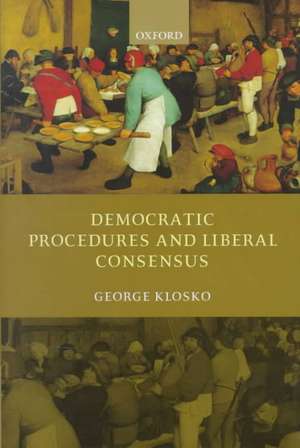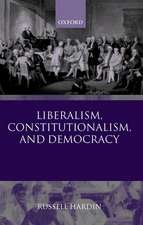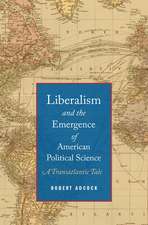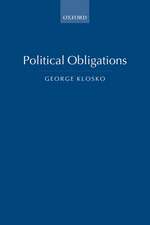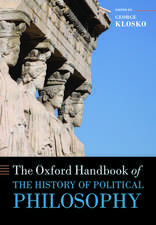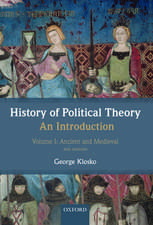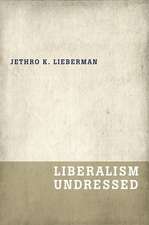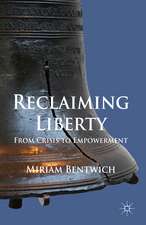Democratic Procedures and Liberal Consensus
Autor George Kloskoen Limba Engleză Hardback – 27 ian 2000
| Toate formatele și edițiile | Preț | Express |
|---|---|---|
| Paperback (1) | 327.42 lei 31-37 zile | |
| OUP OXFORD – 29 ian 2004 | 327.42 lei 31-37 zile | |
| Hardback (1) | 396.13 lei 31-37 zile | |
| OUP OXFORD – 27 ian 2000 | 396.13 lei 31-37 zile |
Preț: 396.13 lei
Preț vechi: 574.93 lei
-31% Nou
Puncte Express: 594
Preț estimativ în valută:
75.81€ • 78.66$ • 63.36£
75.81€ • 78.66$ • 63.36£
Carte tipărită la comandă
Livrare economică 05-11 martie
Preluare comenzi: 021 569.72.76
Specificații
ISBN-13: 9780198292340
ISBN-10: 0198292341
Pagini: 282
Dimensiuni: 163 x 241 x 20 mm
Greutate: 0.56 kg
Editura: OUP OXFORD
Colecția OUP Oxford
Locul publicării:Oxford, United Kingdom
ISBN-10: 0198292341
Pagini: 282
Dimensiuni: 163 x 241 x 20 mm
Greutate: 0.56 kg
Editura: OUP OXFORD
Colecția OUP Oxford
Locul publicării:Oxford, United Kingdom
Recenzii
Democratic Procedures and Liberal Consensus provides an excellent example of political theorising worthy of emulation. Klosko should be applauded for producing a study that is not only engaging and insightful, but also original and a valuable contribution to both the existing literature concerning the character of a viable conception of political liberalism and, more generally, the ongoing debate surrounding the nature of an appropriate conception of justice for contemporary pluralistic societies. Shaun P Young, European Journal of Political Theory, June 2003
Fills a gap between John Rawls's A Theory of Justice and Alan Wolfe's One Nation after All ... includes an excellent, albeit brief, theoretical discussion of empirical research ... This work is well suited for graduate and political theorists interested in contemporary liberalism.
Klosko's argument is very rich, in both the multitude of deep theoretical questions it tackles and the wealth of social science research it draws upon ... Klosko's work does a wonderful job of starting to fill the empirical vacuum in which normative theory proceeds, thus opening the door for the subsequent development of empirically astute accounts of liberal justification.
This study overall sets a fine example of how normative political theory might in particular, and must in general, engage with the messy facts of the real world, a world whose citizens are not the ideal deliberators nor completely reasonable individuals an idealized liberalism would wish them to be.
The originality and attraction of his [Klosko's] study is that it is a work of normative political philosophy solidly rooted in empirically well established facts about the beliefs and values of actually existing citizens.
Makes a contribution to recent debate over liberal political theory ... thoughtful discussion of empirical research.
Klosko's book is informed by both political philosophy and empirical work on religion ... it is a most welcome and admirable contribution.
Klosko's argument is throughout careful and lucid.
Fills a gap between John Rawls's A Theory of Justice and Alan Wolfe's One Nation after All ... includes an excellent, albeit brief, theoretical discussion of empirical research ... This work is well suited for graduate and political theorists interested in contemporary liberalism.
Klosko's argument is very rich, in both the multitude of deep theoretical questions it tackles and the wealth of social science research it draws upon ... Klosko's work does a wonderful job of starting to fill the empirical vacuum in which normative theory proceeds, thus opening the door for the subsequent development of empirically astute accounts of liberal justification.
This study overall sets a fine example of how normative political theory might in particular, and must in general, engage with the messy facts of the real world, a world whose citizens are not the ideal deliberators nor completely reasonable individuals an idealized liberalism would wish them to be.
The originality and attraction of his [Klosko's] study is that it is a work of normative political philosophy solidly rooted in empirically well established facts about the beliefs and values of actually existing citizens.
Makes a contribution to recent debate over liberal political theory ... thoughtful discussion of empirical research.
Klosko's book is informed by both political philosophy and empirical work on religion ... it is a most welcome and admirable contribution.
Klosko's argument is throughout careful and lucid.
Notă biografică
George Klosko is Professor, Department of Government and Foreign Affairs, University of Virginia
